| Srl | Item |
| 1 |
ID:
093059
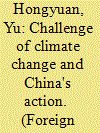

|
|
|
| 2 |
ID:
114860
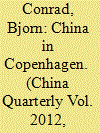

|
|
|
|
|
| Publication |
2012.
|
| Summary/Abstract |
The contradiction between the astonishing dynamic of China's domestic climate policy agenda and its seemingly tenacious position in international climate negotiations presents a puzzle that, on closer inspection, reveals much about a nation at the crossroads, undecided which way to turn. The alterations in China's political interests connected to the issue of climate change are clearly evident in the domestic policy changes China introduced during previous years. However, China's leadership thus far has remained hesitant to translate this new set of interests fully into a coherent position in the international arena. China's mounting difficulties in reconciling its rapidly changing role on the international stage with its altered domestic situation, as well as its traditional foreign policy interests and principles, undermine its ability to pursue a consistent and effective strategy in international climate negotiations. China's reluctance to redefine its role in the international arena has led to a number of inconsistencies that particularly plagued its position during the Copenhagen conference, adding to the overall non-constructive dynamic of the proceedings that ultimately left China, as everyone else, with empty hands. The Copenhagen negotiations demonstrated that China's leadership will have to address these inconsistencies resolutely if it wants to realize the benefits that international climate cooperation offers.
|
|
|
|
|
|
|
|
|
|
|
|
|
|
|
|
| 3 |
ID:
096405
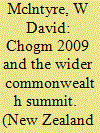

|
|
|
| 4 |
ID:
132386
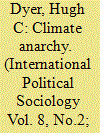

|
|
|
|
|
| Publication |
2014.
|
| Summary/Abstract |
"Climate anarchy" describes the divergence of climate politics from established mechanisms of global governance and an emergent political order. This new (dis)order represents alternative governances and politics, and a challenge to national governmental perspectives on world politics. When interstate policymaking, such as that on climate change, falters at the point of agreement-as it has from Copenhagen in 2009 to Rio+20, and on to Warsaw in 2013-different global relationships are engendered. This occurs as the narrowly defined anarchy of national jurisdictions is superseded by a wider anarchic diversity in political practices. If states must respond to climate change, they are not leading climate policy effectively, and state-centric perspectives cannot account for such political disorder. The ensuing discomfort about the fragmentation of climate governance should be embraced as an opportunity for political innovation, and the diverse responses to climate change viewed as an emerging paradigmatic shift in world politics. The argument thus informs broader debates on policy and governance, as well as conceptual and disciplinary developments, by testing the construction, governance, and anarchy of climate issues.
|
|
|
|
|
|
|
|
|
|
|
|
|
|
|
|
| 5 |
ID:
092252


|
|
|
| 6 |
ID:
098475


|
|
|
| 7 |
ID:
096337


|
|
|
| 8 |
ID:
108318


|
|
|
|
|
| Publication |
2011.
|
| Summary/Abstract |
This article discusses whether global politics are the best means for achieving cosmopolitan ends. It distinguishes the cosmopolitan goal of global obligations from the cosmopolitan politics of global governance. Evidence for cosmopolitanism in society and culture is not strong. In global politics states pursue their own material interests rather than cosmopolitan goals. Copenhagen and the financial crisis did not lead to global cosmopolitan politics as might have been hoped. The article argues that it is dangerous to continue to believe in cosmopolitan politics in such a context. Cosmopolitanism is better pursued through a politics that recognises material interests, conflict, is bottom-up and based in what is happening, rather than top-down and optimistic about cosmopolitan attitudes.
|
|
|
|
|
|
|
|
|
|
|
|
|
|
|
|
| 9 |
ID:
102018
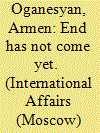

|
|
|
|
|
| Publication |
2010.
|
| Summary/Abstract |
THE SMOKE OF BURNING PEAT BOGS and forests and the losses they caused detracted us for a while from the far from comforting picture of planetary dimensions. Here is the frightening statistics of the year 2010 when big and small catastrophes shook the world: erupting volcanoes grounded aircrafts all over Europe; earthquakes hit many countries; the record-hot summer caused drought in Russia while Europe was nearly inundated. This suggests a logical question: what next? Indeed, to be prepared we should know what is in store for us. The answer is simple: anything might happen.
|
|
|
|
|
|
|
|
|
|
|
|
|
|
|
|
| 10 |
ID:
104408


|
|
|
|
|
| Publication |
New Delhi, KW Publishers, 2011.
|
| Description |
xvi, 218p.
|
| Standard Number |
9789380502489, hbk
|
|
|
|
|
|
|
|
|
|
|
|
Copies: C:1/I:0,R:0,Q:0
Circulation
| Accession# | Call# | Current Location | Status | Policy | Location |
| 056004 | 551.6/KUM 056004 | Main | On Shelf | General | |
|
|
|
|
| 11 |
ID:
100590
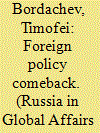

|
|
|
| 12 |
ID:
108874


|
|
|
|
|
| Publication |
2011.
|
| Summary/Abstract |
COP16 of the UNFCCC at Cancun is regarded as a success, compared to the frustrating outcome at Copenhagen. However, the success part relates only to several issues of adaptation. The frustrating aspect is the mitigation part of the regime, which is the ultimate solution, but it remains as intractable as ever. This paper raises few queries including why there were some successes in adaptation, and not any in mitigation. The author argues that nothing positive in this regard at Cancun or any likelihood of its progress in the foreseeable future prodded the industrial countries to agree to some positive steps in adaptation. Still important issues regarding climate finance remain unresolved. Further, a realpolitik approach to upholding national interests and adherence to conventional sense of sovereignty by the major emitters, particularly by the US, stand in the way. The paper ends with a few suggestions on how to put pressure on the emission powers to listen to the call of the day.
|
|
|
|
|
|
|
|
|
|
|
|
|
|
|
|
| 13 |
ID:
093607


|
|
|
| 14 |
ID:
133150
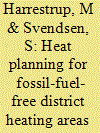

|
|
|
|
|
| Publication |
2014.
|
| Summary/Abstract |
The Danish government plans to make the Danish energy system to be completely free of fossil fuels by 2050 and that by 2035 the energy supply for buildings and electricity should be entirely based on renewable energy sources. To become independent from fossil fuels, it is necessary to reduce the energy consumption of the existing building stock, increase energy efficiency, and convert the present heat supply from fossil fuels to renewable energy sources. District heating is a sustainable way of providing space heating and domestic hot water to buildings in densely populated areas. This paper is a theoretical investigation of the district heating system in the Copenhagen area, in which heat conservation is related to the heat supply in buildings from an economic perspective. Supplying the existing building stock from low-temperature energy resources, e.g. geothermal heat, might lead to oversized heating plants that are too expensive to build in comparison with the potential energy savings in buildings. Long-term strategies for the existing building stock must ensure that costs are minimized and that investments in energy savings and new heating capacity are optimized and carried out at the right time.
|
|
|
|
|
|
|
|
|
|
|
|
|
|
|
|
| 15 |
ID:
098476
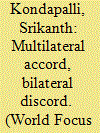

|
|
|
| 16 |
ID:
091469
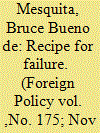

|
|
|
|
|
| Publication |
2009.
|
| Summary/Abstract |
Want to know what's going to happen with climate change? Is the world going to come together this Dcember at the Copenhagen summit or at some future date, and regulate away enough of the Greenhouse gases that are heating up the planet to warm Al Gore's heart?
|
|
|
|
|
|
|
|
|
|
|
|
|
|
|
|
| 17 |
ID:
109860
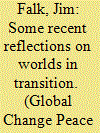

|
|
|
| 18 |
ID:
143642
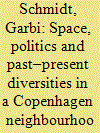

|
|
|
|
|
| Summary/Abstract |
This article responds to the need for a cautious use of the concepts of diversity and social cohesion in migration research. Presently missing in the literature is a historicisation and contextualisation of these concepts that can highlight the heterogeneity of diversity. In our investigation of the cities and neighbourhoods in which migrants settle and how migrants affect these neighbourhoods, it is important to ask whether the diversity of today is significantly different from the diversity a hundred years ago. To provide the missing perspectives, I offer a situated historical analysis of empirical data and ethnographic fieldwork in Nørrebro, a neighbourhood of the Danish capital, Copenhagen. Situating the contemporary heterogeneous characteristics of cities and neighbourhoods within a local history of diversity is useful for our understanding of past and contemporary social solidarities that underlie the perceptions of ‘otherness’ and the changing implications of the focus on immigrant identity.
|
|
|
|
|
|
|
|
|
|
|
|
|
|
|
|
| 19 |
ID:
099796
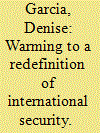

|
|
|
|
|
| Publication |
2010.
|
| Summary/Abstract |
The fundamental idea of this article is that the enormity and nature of the challenges created by climate change are redefining the understanding and definition of international security. The threats posed by climate change have become considered security threats, especially since 2007. I also argue that an international norm concerning climate change started emerging and became consolidated around the same time. The norm building process occurred due to three elements: a basic international legal regime, constituted since the 1992 United Nations Framework Convention on Climate Change (UNFCCC), its 1997 Kyoto Protocol (followed by ratification by the majority of states), and the 2009 political framework set out by the Copenhagen Accord. All this was guided by authoritative scientific evidence throughout. The consolidation of an international norm concerning climate change demonstrates that norm internalization processes in treaties do not automatically result in successful norm crystallization. It took a dramatic shift of position in the domestic arena in the United States and other recalcitrant states for the international norm to consolidate. This shift of mood was multilayered: i.e. it included the participation of many actors in society, especially local and state governments, as well as the private sector. Most importantly, the security aspects of climate change became known and this dimension of the debate gained enormous prominence.
|
|
|
|
|
|
|
|
|
|
|
|
|
|
|
|
| 20 |
ID:
105162


|
|
|
|
|
| Publication |
2011.
|
| Summary/Abstract |
China's rapid economic growth has given rise to equally sharp increases in greenhouse gas emissions. China has already ratified the Kyoto Protocol, yet as the world looks beyond Kyoto, China's willingness to agree to a binding carbon emissions treaty remains a critical question for the international community. This article examines historical adjustments to and recent actions on China's climate change policy, as well as its potential future trajectory, to determine the factors that most shape China's ideal post-Kyoto accord. It analyzes different perspectives on China's involvement in the Copenhagen Summit, the rise of BASIC, and UNFCCC meetings in Tianjin. This article concludes that China, while taking actions to combat climate change domestically, retains much of its historic stance on climate change, which precludes agreeing to external oversight and externally binding emissions cuts.
|
|
|
|
|
|
|
|
|
|
|
|
|
|
|
|